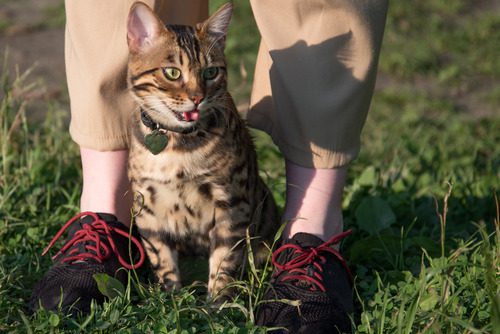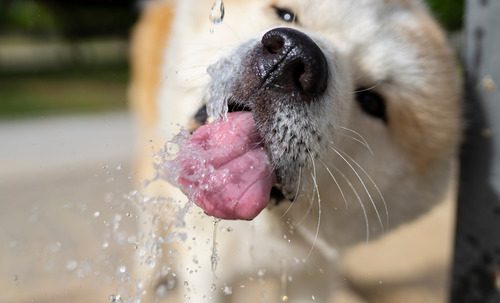Why Does My Dog Have Blood in Their Poop?
Blood in your dog’s poop can be a worrying sight. As a pet owner, you need to understand why this might happen and when it’s time to seek help from professionals. This blog will explore common causes of blood in stool and what they could mean for your dog’s health. If you’re concerned about what you’re seeing, please reach out to your nearest Heart + Paw facility for guidance and to arrange an appointment. Our team is ready to support you with advice and care for your dog.

What Does It Mean If Your Dog is Pooping Blood?
When you notice blood in your dog’s stool, it’s natural to feel alarmed. This condition, known medically as hematochezia or melena depending on the appearance of the blood, can have various causes. Bright red blood typically suggests issues in the lower digestive tract, while darker blood can indicate problems in the upper gastrointestinal system. It’s important to note the color and consistency of your dog’s stool, as it helps your veterinarian diagnose the issue more accurately.
Common Causes of Blood in Dog Poop
Several factors can lead to your dog pooping blood, ranging from minor concerns to more serious conditions. Here are some common causes:
- Dietary Changes or Food Intolerances: Sudden changes in diet or consuming inappropriate food can upset your dog’s stomach.
- Infections: Bacterial, viral, or parasitic infections can cause gastrointestinal bleeding.
- Inflammatory Disorders: Conditions like colitis may lead to inflammation and bleeding in the intestines.
- Intestinal Obstructions: Objects your dog may have swallowed can also cause blockages and bleeding.
- Underlying Health Issues: Diseases such as cancer or coagulation disorders could also be responsible.
When to See Your Veterinarian
It’s essential to monitor your dog’s overall health and behavior. If the blood in the poop is accompanied by other symptoms like vomiting, lethargy, or a loss of appetite, contact your vet. Our Heart + Paw veterinarians are equipped to diagnose a wide range of health problems in pets and provide the necessary care to ensure a smooth recovery. Early detection and treatment can reduce your dog’s symptoms and discomfort and help them return to a happy, healthy life much quicker.
What We Can Do to Diagnose Your Pet
To understand the cause of blood in your dog’s stool, your vet may recommend several diagnostic tests. These can include:
- Physical Examination: The first critical step is the exam. We’ll do a thorough check-up to look for signs of illness or discomfort.
- Fecal Examination: If necessary, our team will screen your pet for parasites and/or bacterial infections.
- Blood Tests: A blood test may be needed to assess your dog’s overall health and detect any underlying conditions.
- Imaging Tests: If another step is needed, we might recommend X-rays or ultrasounds to see if there are any blockages or abnormalities in your pet’s digestive tract.
Treating Blood in Stool
The treatment for blood in your dog’s poop depends on the underlying cause. Some possible treatments include:
- Dietary Management: Adjusting your dog’s diet to manage food intolerances or allergies.
- Medication: To treat infections or inflammation.
- Surgery: In cases of obstructions or certain diseases, surgery might be necessary.
Each dog is unique, and so is their treatment plan. Our Heart + Paw team tailors care to your dog’s specific needs.
Preventive Measures and Long-Term Care
While not all causes of blood in dog poop can be prevented, some general practices can help you maintain your dog’s digestive health:
- Consistent Diet: Avoid sudden dietary changes and stick to high-quality dog food.
- Regular Check-Ups: Routine visits to the vet can help catch issues early.
- Parasite Control: Regular deworming and flea control are important.
- Awareness: Keep an eye on what your dog eats and plays with to prevent accidental ingestion of harmful items.
Call Heart + Paw for Help and More Information
If you’re worried about blood in your dog’s poop, don’t wait to seek professional advice. Call your nearest Heart + Paw facility to discuss your concerns and schedule an appointment. Our team is here to assist you with expert care and advice, ensuring your dog’s health and happiness.
Remember, early intervention can be key to effectively managing health issues. Our veterinary professionals are committed to providing quality care and support for you and your dog!
Recent Posts
Signs Your Cat Could Have Anxiety
When you think of anxiety, you might not immediately associate it with cats. However, our feline friends…
Is My Pet Alright? When Cat Panting Requires a Vet Visit
Caring for our cats means paying attention to all the little details that make them unique. One…
7 Plants Toxic to Cats that Could be in Your Home or Garden
Creating a safe and inviting space for our beloved cats often involves more than just providing them…
Dog Tooth Abscesses: Signs, Causes, Treatment and Prevention
When it comes to keeping your dog happy and healthy, oral health plays a significant role that…
Why Is My Dog Always Thirsty and Drinking a Lot of Water?
If you’ve noticed your dog lapping up more water than usual, you might be wondering if it’s…
About Us
Heart + Paw was founded in 2018 by Chief Veterinary Officer Dr. George Melillo, who currently serves the Mid-Atlantic area. Heart + Paw offers a combination of veterinary care, pet grooming, and dog daycare to help be a resource in your pet parenthood journey.
We'd Love to Meet Your Four-Legged Friends
Find out how the friendly veterinary team at your local Heart + Paw can help your pets live longer, healthier lives by searching for a location near you.





